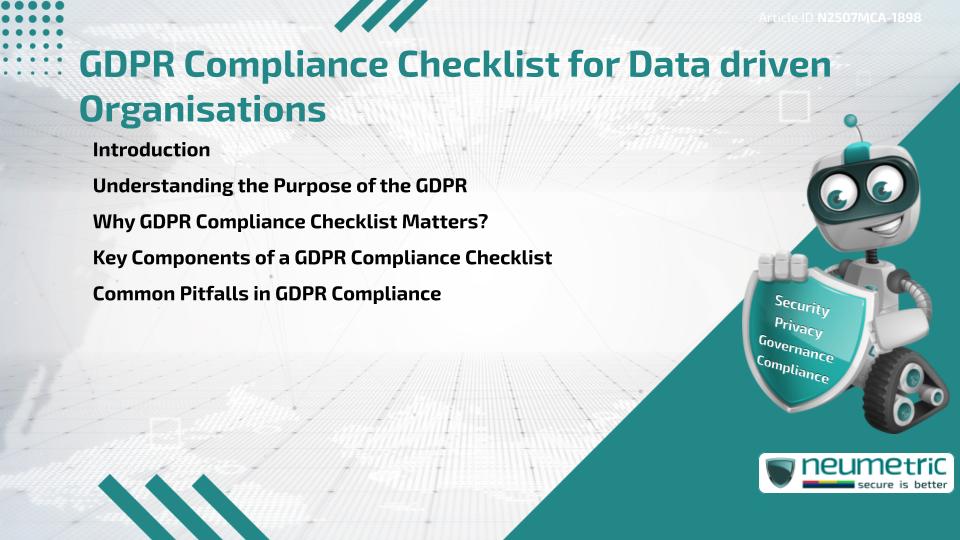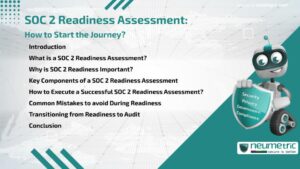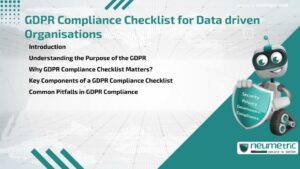Table of Contents
ToggleIntroduction
A clear & actionable GDPR Compliance Checklist is essential for any Data driven Organisation operating within or dealing with the European Union. The General Data Protection Regulation [GDPR] sets strict Guidelines for How Personal Data is collected, stored & processed. Non-Compliance can lead to heavy Fines & Reputational Damage. This Article outlines the purpose of GDPR, the importance of Compliance & essential Checklist Items every Organisation should follow.
Understanding the Purpose of the GDPR
The GDPR was introduced by the European Union in 2018 to protect the Personal Data of individuals & give them more control over how their Data is used. It applies to all Businesses that collect or process the Data of EU residents, regardless of where the Business is located. The Regulation aims to increase Transparency, Accountability & Security in Data Handling Practices.
Why GDPR Compliance Checklist Matters?
A GDPR Compliance Checklist helps ensure your Organisation meets all the Legal requirements efficiently. It reduces the Risk of Non-compliance, helps in Internal Audits & Streamlines Documentation. This is especially important for Data driven Organisations that manage large Volumes of Personal & Behavioural Data.
Key Components of a GDPR Compliance Checklist
Here are the most Critical Elements to include in your Checklist:
- Data Mapping
Identify & Document What Personal Data you collect, Where it is stored, Who has access & How it is processed. - Lawful Basis for Processing
Ensure there is a Legal reason for every type of Data Processing you Conduct, such as Consent, Contract Performance or Legitimate Interest. - Privacy Notices
Provide clear, accessible Privacy Notices to inform Individuals about Data collection & usage. - Consent Management
Collect & Store User Consent for Data Processing where required, using Opt-in Methods. Allow easy withdrawal of Consent. - Data Subject Rights
Establish processes for Individuals to exercise their Rights, including Access, Correction, Erasure & Data Portability. - Data Protection Impact Assessments [DPIAs]
Conduct DPIAs for High-risk Data Processing activities to identify & mitigate Risks. - Third Party Risk Management
Review Contracts with Vendors who process Personal Data & ensure they meet GDPR Standards. - Data Breach Procedures
Implement Procedures to Detect, Report & Investigate Personal Data Breaches within 72 hours. - Data Security Measures
Apply Encryption, Access Control & regular Audits to secure Data both in Transit & at Rest. - Appoint a Data Protection Officer [DPO]
If applicable, assign a DPO to oversee Compliance & Serve as the Contact Point for Regulators.
Common Pitfalls in GDPR Compliance
Many Organisations fail due to inconsistent Record-keeping, vague Privacy Notices or Lack of Breach Reporting processes. To avoid these issues, regularly review & update your GDPR Compliance Checklist based on Regulatory Updates & Business Changes. Relying only on Templates or Ignoring Vendor Risks can also compromise Compliance efforts.
Takeaways
- The GDPR Compliance Checklist is crucial for protecting Personal Data & Avoiding Regulatory Penalties.
- Key Items include Data Mapping, Consent Management & Security Protocols.
- Regularly Review & Update your practices to align with GDPR expectations.
FAQ
Who needs to Comply with the GDPR?
Any Organisation that processes the Personal Data of EU Residents, regardless of Location, must Comply.
Is Consent always required under GDPR?
No. Other Lawful bases include Contract Necessity, Legal Obligation & legitimate Interest.
What is a DPIA & When is it needed?
A Data Protection Impact Assessment is required when processing is likely to result in high Risk to Individuals’ Rights & Freedoms.
Do Small Businesses need a DPO?
Only if their Core activities involve Large-scale Monitoring or Processing of Sensitive Data.
How soon must a Data Breach be Reported?
Within Seventy-two (72) hours of becoming aware of the Breach.
References
- GDPR Official Portal
- European Data Protection Board Guidelines
- UK ICO GDPR Guide
- NIST Privacy Framework
- IT Governance GDPR Resources
Need help for Security, Privacy, Governance & VAPT?
Neumetric provides Organisations the necessary help to achieve their CyberSecurity, Compliance, Governance, Privacy, Certifications & Pentesting needs.
Organisations & Businesses, specifically those which provide SaaS & AI Solutions in the Fintech, BFSI & other regulated sectors, usually need a CyberSecurity Partner for meeting & maintaining the ongoing Security & Privacy needs & requirements of their Enterprise Clients & Privacy conscious Customers.
SOC 2, ISO 27001, ISO 42001, NIST, HIPAA, HECVAT, EU GDPR are some of the Frameworks that are served by Fusion – a SaaS, multimodular, multitenant, centralised, automated, CyberSecurity & Compliance Management system.
Neumetric also provides Expert Services for technical Security which covers VAPT for Web Applications, APIs, iOS & Android Mobile Apps, Security Testing for AWS & other Cloud Environments & Cloud Infrastructure & other similar scopes.
Reach out to us by Email or filling out the Contact Form…





